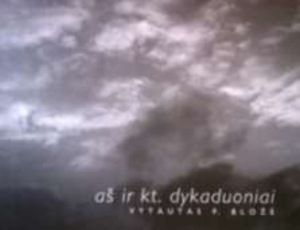SILENT WAITING IN TIME AND LANGUAGE 0
Mindaugas Grigaitis
www.kamane.lt, 2010 02 09
In brief: It is often stated that Lithuanians are lyricists. Still, there are not so many poets who would not mind the influence of market economics on literature and would take care about creation rather than advertisement nowadays. Of course, several real poets do exist.
Vytautas P.Bložė could be called a silent poet. It seems that his aim is not to chase literature fashions and marketing strategies but to be with poetry silently. Not much has been written about his poetry recently. Still, the poet is still writing. He observes himself calmly and attentively and waits patiently for a word which would illuminate the road to existence to him and others.
The selection of poems of V.P.Bložė “Me and other Layabouts“ published last year did not cause much noise. However, silence gives birth to additional intrigue in these blatant times. The title of the book encouraged the author of the article to take a look what the book was about. The title prepared the reader for an ironic and playful look at oneself. Although there was not much of the ironic playfulness in the selection. There was more of tension of being in time and language.
The deep feeling of passing time penetrates the whole collection. The motif is not new but it tells much. By travelling through the past time, the poet realises the present. Views of memories pour down spontaneously, they fill the language with feelings, senses and combine the separate fragments of memories into the united view of poems.
The past thrusts into the present in almost every poem of the selection “Me and other Layabouts“. The conscience of the poet seems to be imprisoned in the elements of time and language that do not obey it. These elements tear one by multiple images but do not turn into signs of clear identity.
The feeling of endless change determines the repetition of motifs of homelessness, wandering and doing nothing. While “doing nothing”, V.P.Bložė experiences that waiting in time and language never ends – it continues as well as existence always exists. As a result, existence in endless change becomes unbearable burden.
There are many painful frustrations in the newest selection of V.P.Bložė; nonetheless, pain does not turn into weepy therapy or screaming action. “Me and other Layabouts” is a painful reconciliation with the fact that the word does not turn into body – it always remains a symbol.
V.P.Bložė does not aim to cry about his frustration or to enjoy in macabre way the fact that you do not know what you are in “Me and other Layabouts”. Painful personal experience disgorges into language insensibly, and the impression is created that the poet himself has dispersed in the language. The reader is forced to refuse the traditional habit to search what the poet wanted to say while reading the selection. It is the language, which existed in time before the poet and the reader, that encompasses them both and does not let any of them appropriate the truth. The language becomes the speaker. Such status of language may be called poetry.

